SWT/KWS MT. KENYA MOBILE VETERINARY UNIT OCTOBER 2022







In October 2022, the Mt. Kenya Mobile Veterinary Unit attended to all reported wildlife emergencies requiring urgent veterinary intervention in the Laikipia ecosystem and the Mt. Kenya region. The Mt. Kenya Veterinary Unit attended to 15 cases in October Most cases (8) involved mountain bongos, but the Veterinary Unit also attended to 4 Rhinos cases and 3 elephant cases.
Some of the highlights in October included the translocation of 14 white rhinos from the Oljogi Pyramid to Oljogi ranch to decongest the Pyramid area thereby reducing territorial fights; the translocation of 4 white rhinos from Meru National Park to Partikilat Conservancy in Masai Mara; and the rescue of a male elephant calf found abandoned in Enasoit, Laikipia.
We greatly appreciate the Sheldrick Wildlife Trust (SWT) for the continued support which enables the Mt Kenya Veterinary Unit to respond promptly to wildlife emergencies and offer lifesaving treatment.
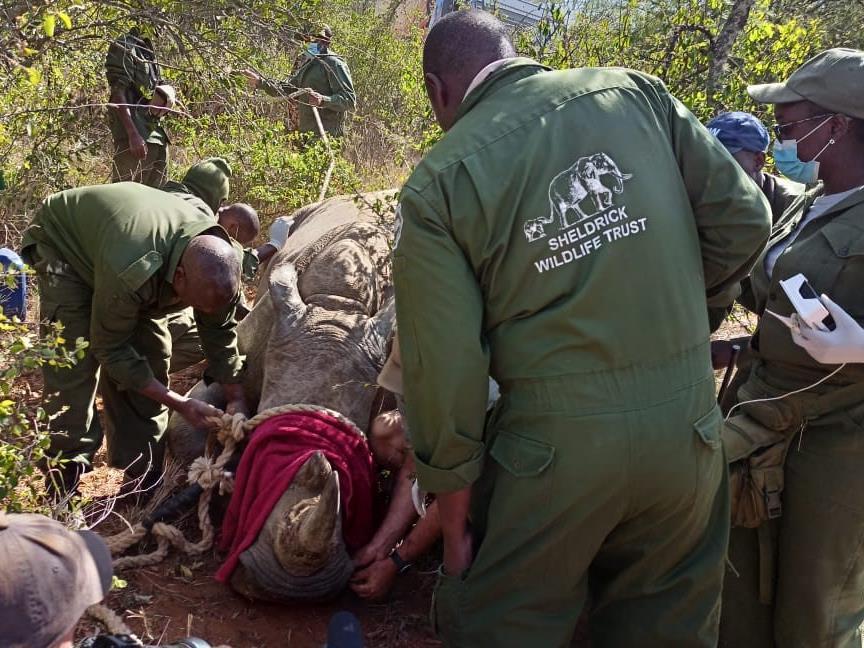
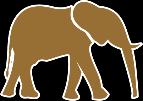

Date
Species Area Found
03-Oct 22 to 07-Oct 22 Rhino Oljogi Pyramid Relocation
Outcome
Translocation of 14 white rhinos from the Oljogi Pyramid to the Oljogi ranch Task successful
04-Oct 22 Rhino Oljogi Conservancy Natural Causes Follow up treatment for wounds sustained during a territorial fight Died
04-Oct 22 Elephant Enasoit Rescue Elephant calf found abandoned Task successful
07-Oct 22 Bongo Mt. Kenya Conservancy Natural Causes Swelling on the left jaw and translocation from one boma to another Successfully treated
07-Oct 22 Bongo Mt. Kenya Conservancy Natural Causes Frothing at the mouth Successfully treated
10-Oct 22 Bongo Mt. Kenya Conservancy Postmortem Adult female mountain bongo found dead in one of the bomas Died
13-Oct 22 Rhino Meru N.P. Relocation
Translocation of 4 white rhinos from Meru National Park to Partikilat, Maasai Mara Task successful
14-Oct 22 Bongo Mt. Kenya Conservancy Natural Causes Abscess on the left jaw Successfully treated
14-Oct 22 Bongo Mt. Kenya Conservancy Natural Causes High fecal count and an unusually rough coat Successfully treated
15-Oct 22 Elephant Kimanjo, Laikipia Natural Causes Elephant calf found abandoned Successfully treated
21-Oct 22 Bongo Mt. Kenya Conservancy Natural Causes Limping and diarrhea Successfully treated
21-Oct 22 Elephant Kimanjo, Laikipia Bullet wound Limping with a swollen left hind limb Successfully treated
24-Oct 22 Rhino Solio Ranch Postmortem Black rhino carcass found by the security team Died
24-Oct 22 Bongo Mt. Kenya Conservancy Natural Causes Dull and in appetent Successfully treated
28-Oct 22 Bongo Mt. Kenya Conservancy Natural Causes Repeat treatment for diarrhoea Successfully treated
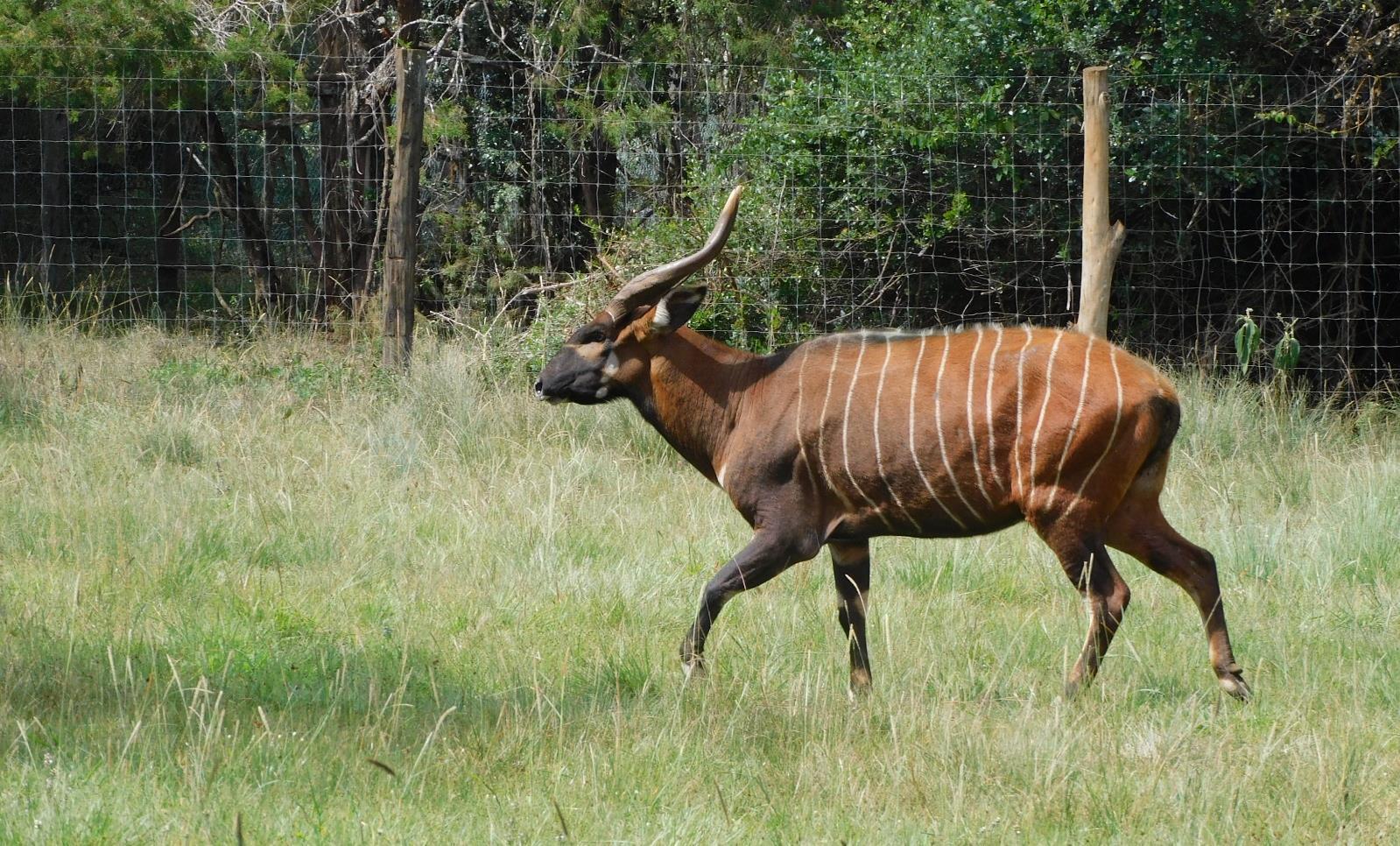
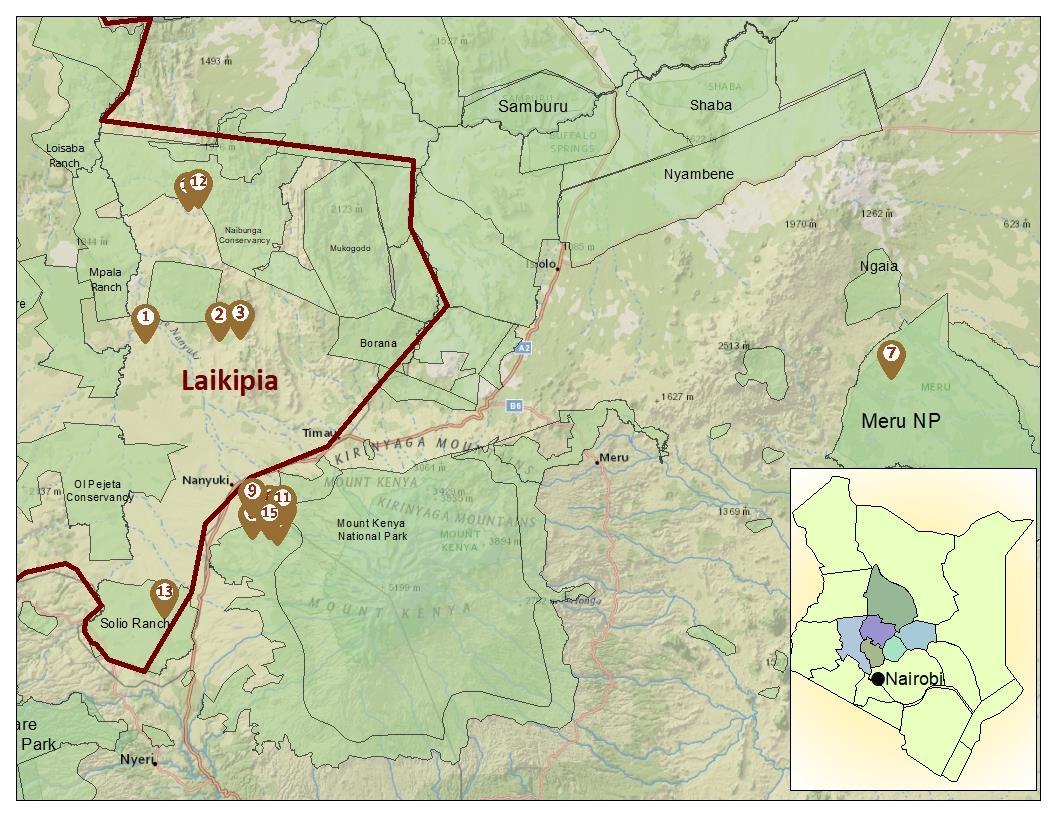
The Mt. Kenya Mobile Veterinary Unit supported the translocation of 14 white rhinos from the Oljogi Pyramid to the Oljogi ranch to decongest the Pyramid area thereby reducing territorial fights which have resulted in injuries and/or mortalities in the recent past. 14 white rhinos in total (7 males and 7 females) comprising adults and sub-adults were translocated from the Pyramid area to the Ranch
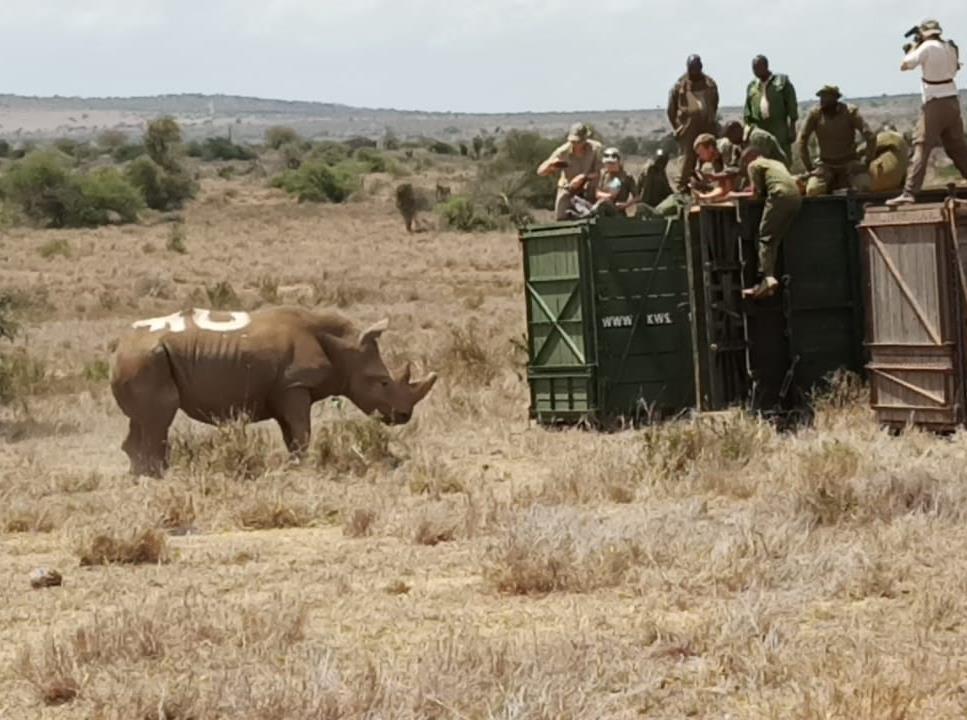

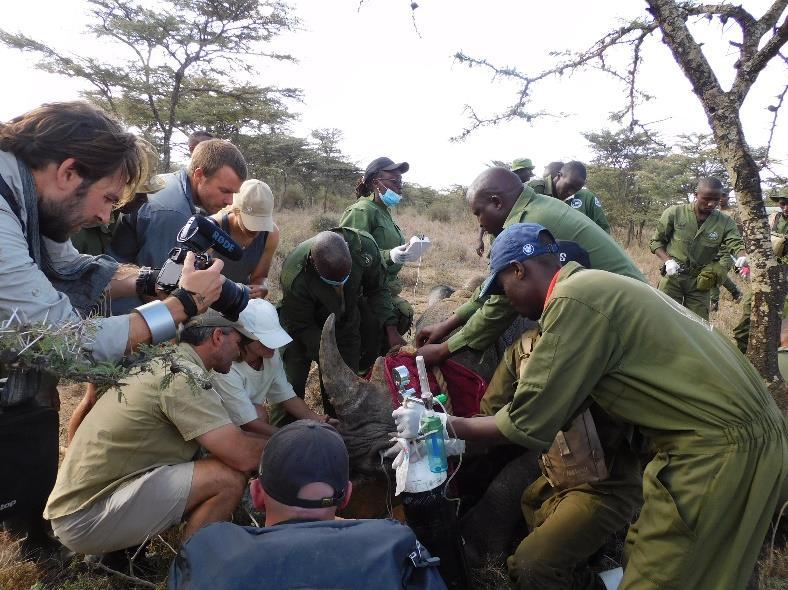
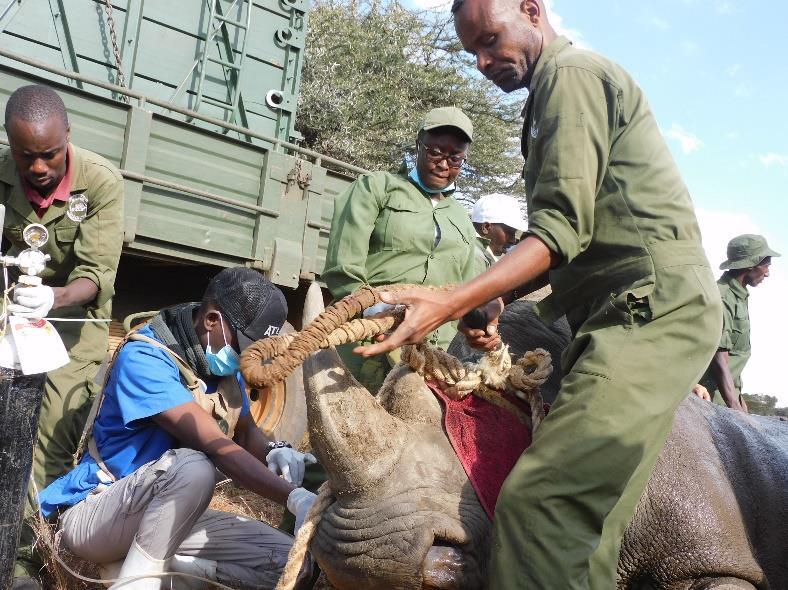
Lali, a male black rhino calf, had been treated on 05th September 2022 for wounds sustained during a territorial fight in Oljogi conservancy. Follow up treatment was undertaken, but unfortunately he did not recover from the injuries. Lali was later found recumbent. He was rescued and taken to a holding boma for treatment and care
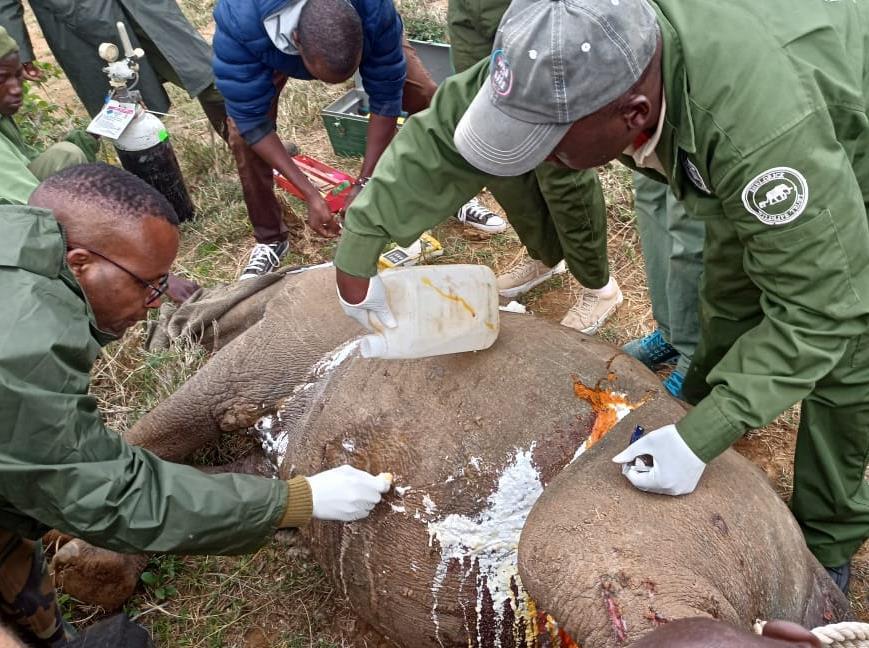
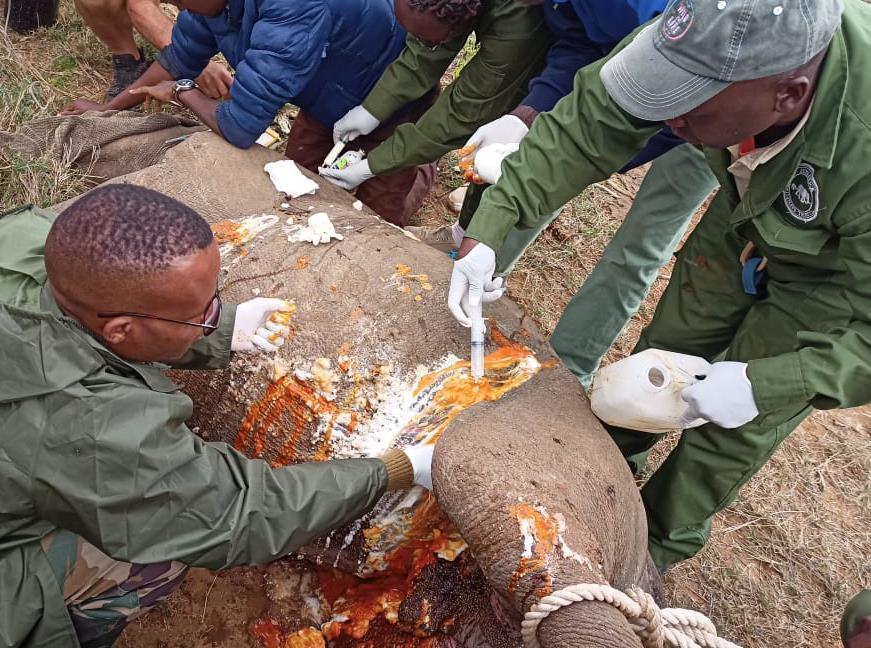

Lali the rhino was physically restrained by ropes and blindfolded for further examination and treatment. He had multiple, traumatic, deep wounds in the inguinal region and around the chest region. 15,000 mgs Amoxicillin, 1,000 mgs Flunixine meglumine and 40 mls Multivitamin were given intramuscularly. The multiple wounds were debrided with Hydrogen peroxide, flushed with Iodine and sprayed with Oxytetracycline. Lali was then translocated to a boma within the conservancy and given intravenous fluids.
The prognosis was grave, and he later succumbed to the injuries.
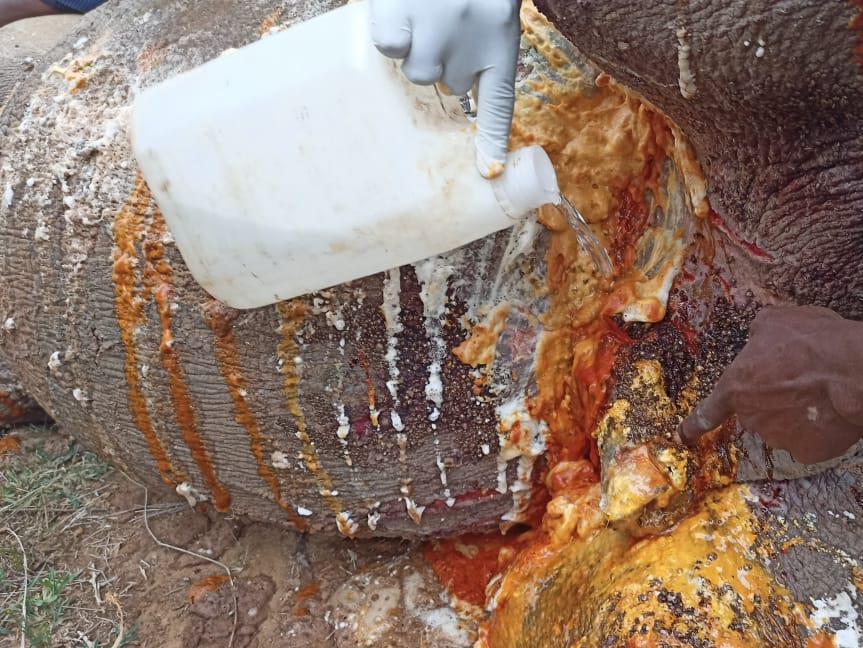
The elephant calf was observed to be in good body condition. It was rescued and flown by caravan to the Sheldrick Wildlife Trust Nairobi Nursery where it will be rehabilitated. The calf was translocated while under close monitoring of vitals.
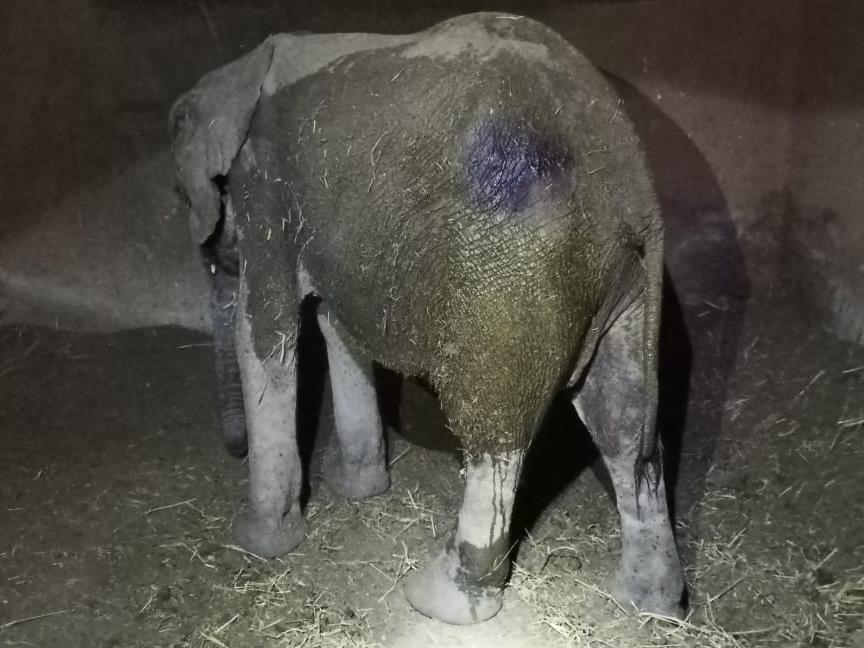
The calf arrived at the SWT Nairobi Nursery in good health
An adult female mountain bongo called Ukame was reported to have a swelling on the left jaw. A request was also made for her to be translocated from one boma to another within the conservancy.
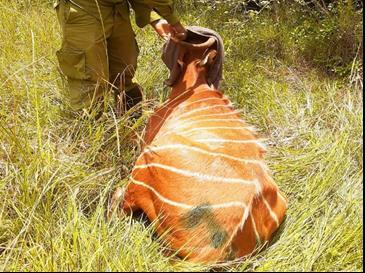
Ukame was approached on foot and darted with 3 mgs Etorphine and 40 mgs Azaperone. The dart landed on the left rump, and the drug took effect after 5 minutes. She went down on right lateral recumbency after which she was physically restrained. Treatment and anaesthesia monitoring was done simultaneously, and oxygen supplementation was administered for optimal breathing. It was observed that Ukame had an abscess on the left jaw, she also had overgrown hooves. 6,000 mgs Amoxicillin was administered intramuscularly then the abscess was lanced, and the pus was drained. The pocket was debrided with Hydrogen peroxide and flushed with Iodine. Additionally, the overgrown hooves were trimmed with a hoof trimmer. Anaesthesia reversal was done with 100 mgs Naltrexone administered via the jugular vein, and she rose 2 minutes later.
Ukame has a good prognosis.
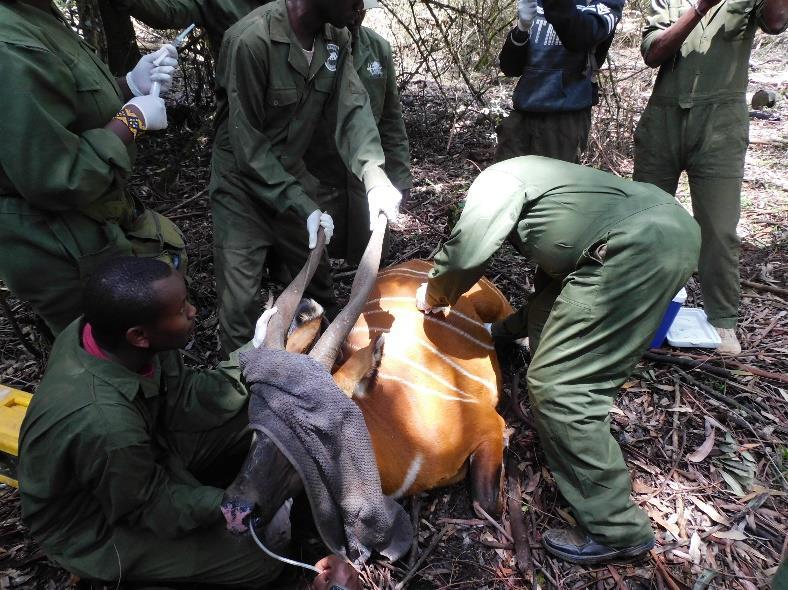
She was darted with 3 mgs Etorphine and 40 mgs Azaperone on the right rump. The drug took effect after 5 minutes, and she went down on left lateral recumbency. Tumaini was then physically restrained. Treatment and anaesthesia monitoring was done simultaneously, and oxygen supplementation was administered for optimal breathing.
It was observed that Tumaini was in good body condition. However, she was frothing from the mouth, and she had no incisors, canines and premolars. 9,000 mgs Amoxicillin, 20 ml Multivitamin and 20 mg Dexamethasone were administered intramuscularly. Anaesthesia was reversed with 100 mgs Naltrexone administered via the jugular vein. She rose after 2 minutes.
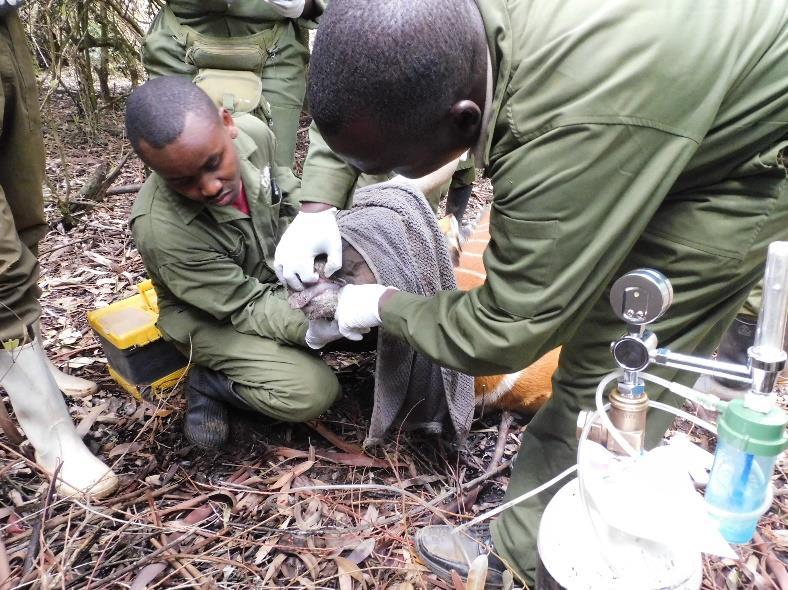
Tumaini has a good prognosis.
Tumaini, the adult female mountain bongo treated on 07th October 2022, was found dead in one of the bomas
▪
The carcass had froth in the mouth.
▪ There was froth in the trachea, bronchi and bronchioles.
▪ There was presence of feed in the trachea, bronchi and bronchioles.
▪
The rumen was full of feed, and the intestines were empty.
Tumaini died from aspiration pneumonia. No pictures are available for this case.
Case 7 – 13th October 2022
The Mt. Kenya Veterinary Unit supported the translocation of 4 white rhinos from Meru National Park to Partikilat Conservancy, Masai Mara.
Immobilization and relocation
4 white rhinos (3 females and 1 male) were successfully darted from a helicopter, loaded into rhino crates and translocated to Partikilat Conservancy in the Masai Mara area to start a new population.
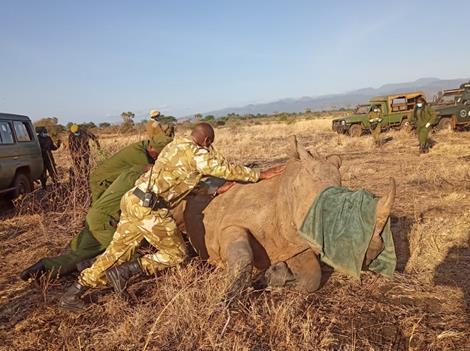
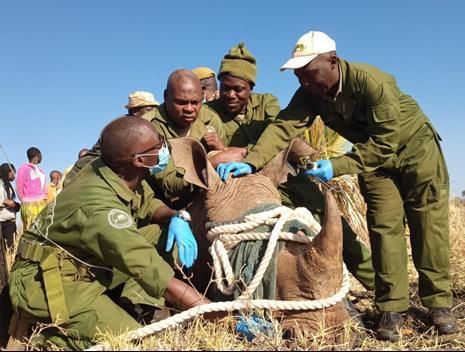
A female mountain bongo calf called Karimi was reported to have a swelling on the left jaw.
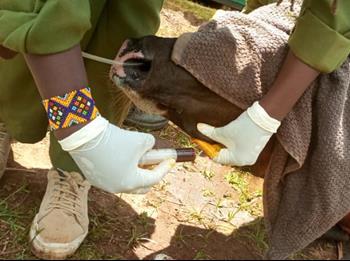
Karimi was approached on foot and darted with 1.5 mgs Etorphine and 20 mgs Azaperone on the right rump. She went down on left lateral recumbency 5 minutes later as the drugs took full effect. She was then placed in sternal recumbency and physically restrained. Treatment and anaesthesia monitoring was done simultaneously, and oxygen supplementation was administered for optimal breathing. Karimi had an abscess on the left jaw. 6,000 mgs Amoxicillin was administered intramuscularly then the abscess was lanced, and the pus it contained was drained leaving a pocket that was debrided with Hydrogen peroxide and flushed with Iodine. Karimi’s overgrown hooves were also trimmed. Anaesthesia was reversed with 75 mgs Naltrexone administered via the jugular vein; she rose after 2 minutes.
Karimi has a good prognosis.
Harper, a female mountain bongo calf, was reported to have a high faecal count and an unusually rough coat.
She was approached on foot and darted with 1.5 mgs Etorphine and 20 mgs Azaperone on the right rump. Harper went down on right lateral recumbency 5 minutes later as the drugs took full effect. Treatment and anaesthesia monitoring was done simultaneously, and oxygen supplementation was administered for optimal breathing. Harper was noted to have an abnormally rough coat, although she was in good body condition. She was dewormed with 5mls oral Fenbendazole then anaesthesia was reversed with 75 mgs Naltrexone administered via the jugular vein. She rose after 2 minutes
Harper has a good prognosis.
No pictures are available for this case.
The Mt Kenya Mobile Veterinary Unit responded to a report of an abandoned elephant calf in Kimajo area, Laikipia.
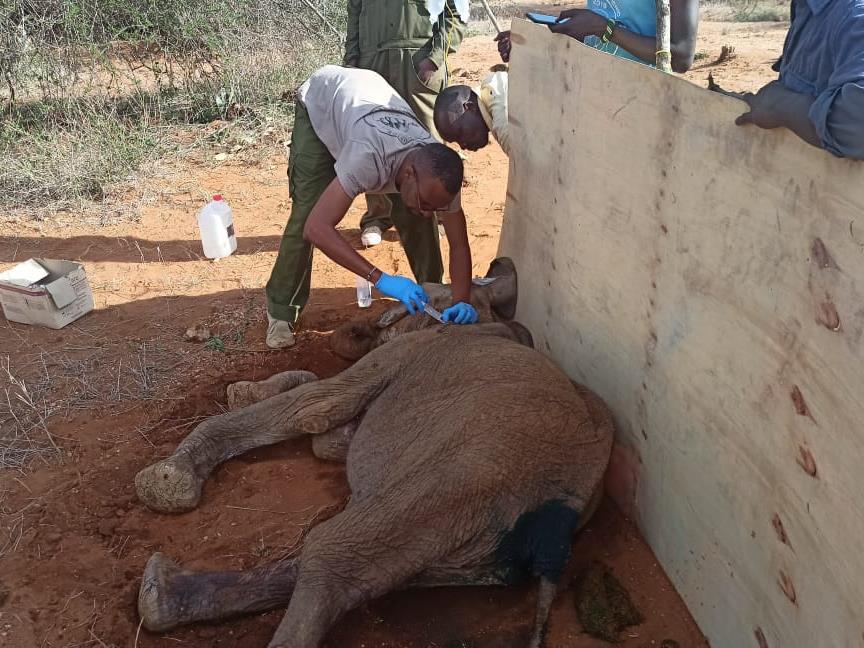
The elephant calf was physically restrained for examination and treatment. The calf was observed to have poor body condition, yellowish chalky fluid was seen seeping from the penis, it was dehydrated, weak and was oozing a mucoid discharge from the mouth. The abandoned elephant calf also had an injury at the base of the tail. An intravenous drip was administered through the ear vein; 2 bottles (1000 mls) Dextrose 50%, 2 bottles (1000mls) Dextrose 10%, 3 bottles Ringer’s lactate and 1 bottle normal saline were administered. The wound at the base of the tail was debrided with Hydrogen peroxide, flushed with Iodine and sprayed with Oxytetracycline. A short while later, the elephant calf regained enough energy to rise and re-join the rest of the herd nearby.
The calf has a good prognosis due to timely intervention.
An adult male mountain bongo called Riziki was reported to exhibit limping and diarrhoea
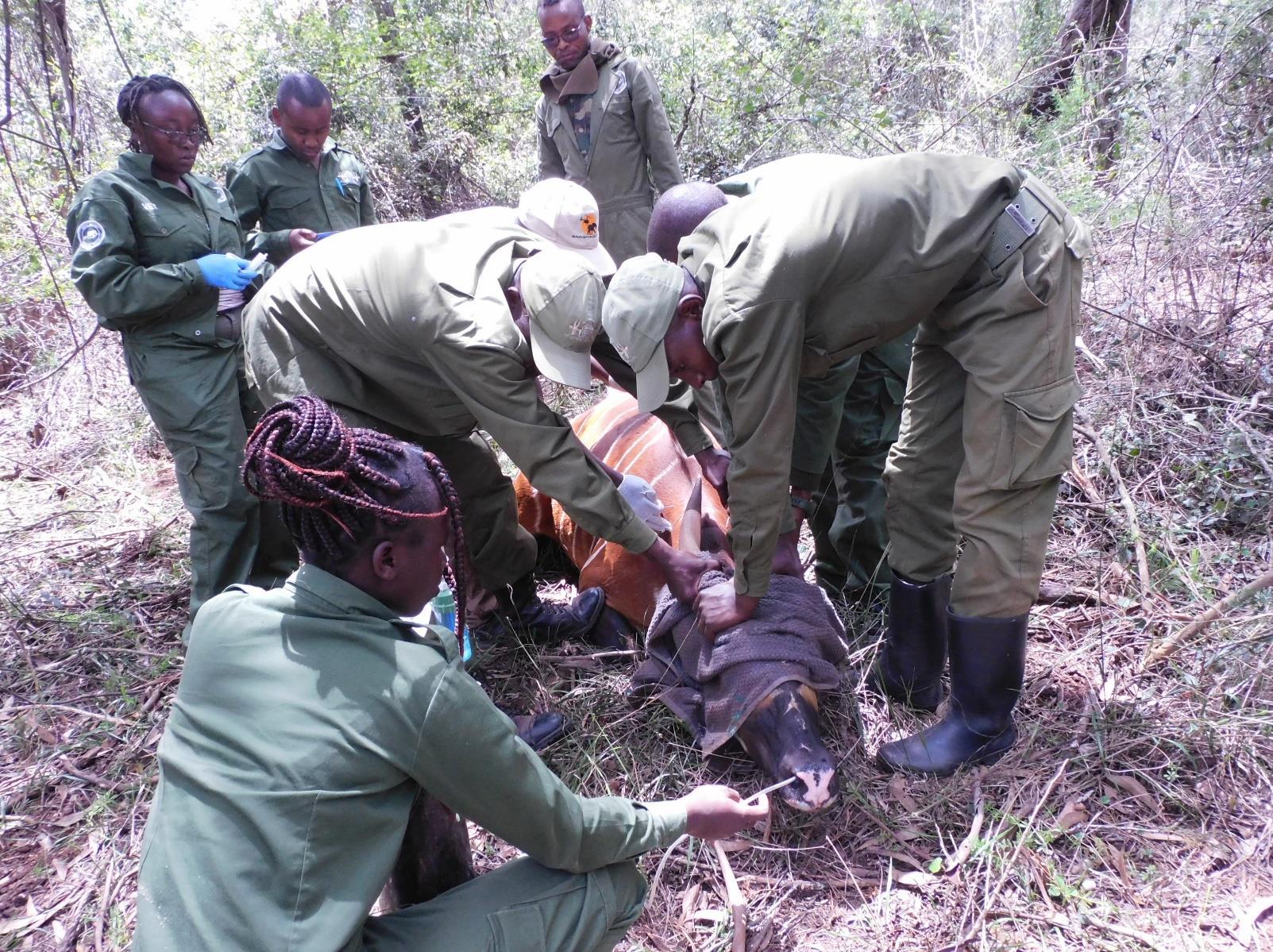
Riziki was darted with 5 mgs Etorphine and 40 mgs Azaperone on the right rump. The drug took effect after 5 minutes. He went down on right lateral recumbency then he was physically restrained. Treatment and anaesthesia monitoring was done simultaneously, and oxygen supplementation was administered for optimal breathing. Riziki was in good body condition; he had a cracked hoof on the right forelimb that extended to the adjacent soft tissues causing pain. 6,000 mgs Amoxicillin and 20 mls Catosal wered administered intramuscularly 10 cc Fenbendazole was given orally and 3 cc Baytricol subcutaneously. The overgrown hooves were trimmed with a hoof trimmer and the injured hoof was debrided with Hydrogen peroxide, flushed with Iodine and sprayed with Oxytetracycline. Anaesthesia was reversed with 100 mgs Naltrexone administered via the jugular vein. Riziki rose 2 minutes later.
He has a good prognosis.
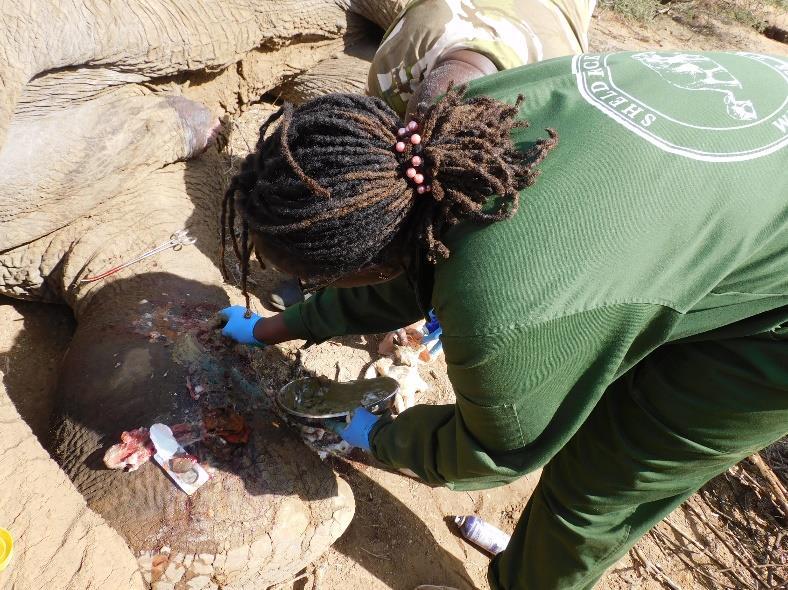
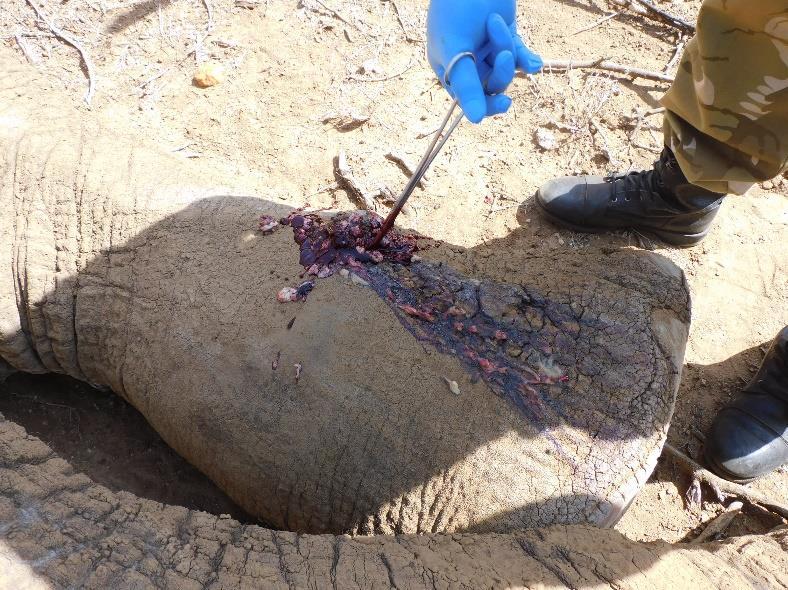
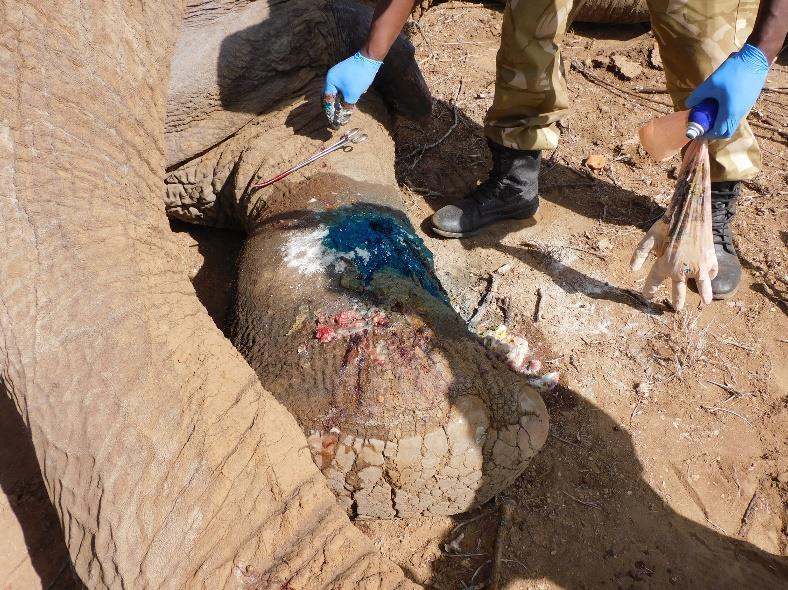
This adult male elephant was reported to exhibit limping and had a swollen left hind limb.
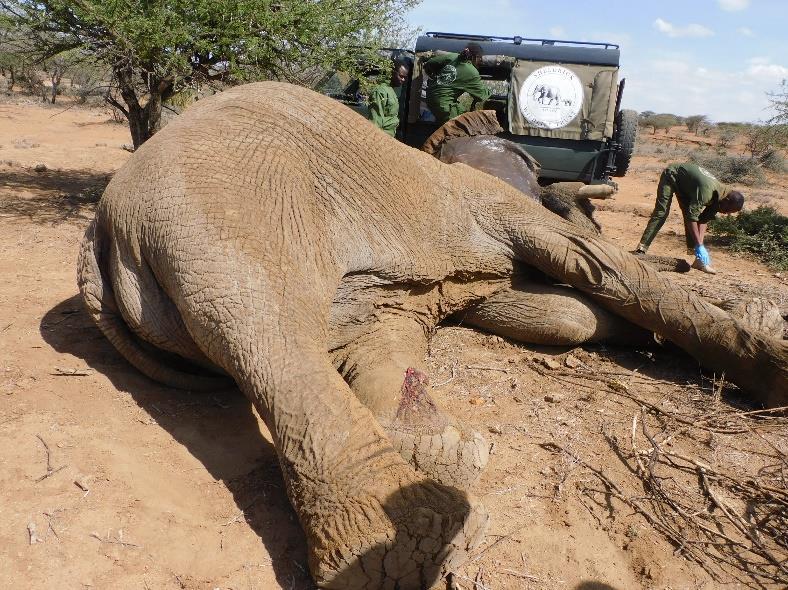
The elephant was approached on foot and darted with 17 mgs Etorphine on the right rump. The drug took effect after 6 minutes with the elephant going down on right lateral recumbency. The elephant bull was observed to be in good body condition, it had a penetrating bullet wound that had caused swelling on the left hind limb. 8,000 mgs Phenylbutazone and 15,000 mgs Amoxicillin were administered intramuscularly. The wound was debrided with Hydrogen peroxide, flushed with Iodine, packed with green clay paste and sprayed with Oxytetracycline. Anaesthesia was then reversed with 200 mgs Naltrexone administered via the ear vein. The elephant rose after 5 minutes.
The elephant bull has a good prognosis.
The Solio Conservancy security team found a black rhino carcass and requested for a post-mortem examination to establish the cause of death.
The carcass was found lying in left lateral recumbency. It was quite bloated and decomposed, and it was confirmed that the same rhino had been treated on 16th September 2022 for several subcutaneous filarial wounds caused by reduced immunity due to old age.
The rhino died of old age complications leading to lowered immunity and opportunistic parasitic and bacterial infections. The carcass was buried to avoid environmental contamination.
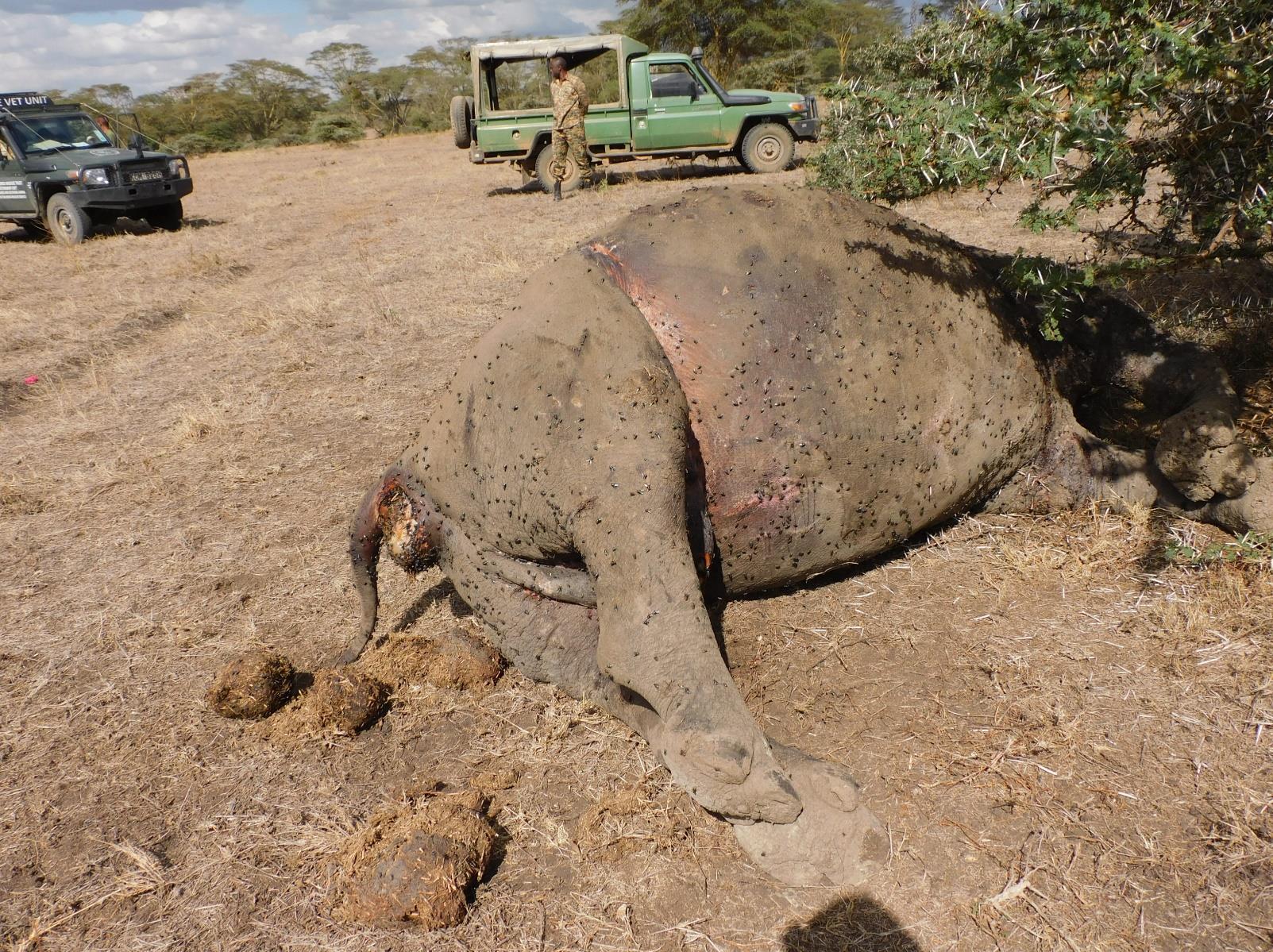
An adult female mountain bongo called Nehema was reported to be dull and inappetent
Nehema was approached on foot and darted with 5 mgs Etorphine and 40 mgs Azaperone on the right rump. The drug took effect after 5 minutes. She went down on right lateral recumbency then she was physically restrained. Treatment and anaesthesia monitoring was done simultaneously, and oxygen supplementation was administered for optimal breathing. Rehema’s body condition was observed to have deteriorated. 9,000 mgs Amoxicillin, 4,000 mgs Phenylbutazone and 20 mls Multivitamin were administered intramuscularly. 15 cc Fenbendazole was also given orally. Anaesthesia was reversed with 100 mgs Naltrexone administered via the jugular vein. She rose after 2 minutes.
Nehema has a good prognosis. No pictures are available for this case.
This case entailed the repeat treatment of Riziki, a male adult mountain bongo, treated on 21st October 2022 for diarrhoea and a cracked hoof.
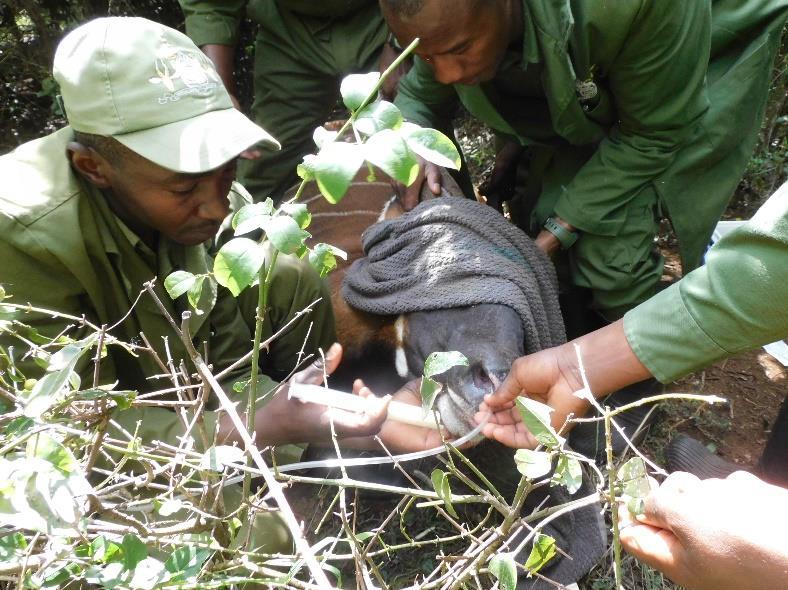
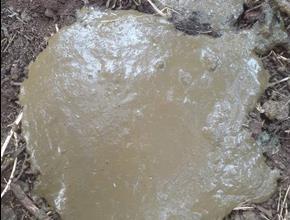
Riziki was darted with 5 mgs Etorphine and 40 mgs Azaperone on the left rump. The drug took effect after 5 minutes. He went down on right lateral recumbency then he was physically restrained. Treatment and anaesthesia monitoring was done simultaneously, and oxygen supplementation was administered for optimal breathing. Riziki’s body condition was observed to have deteriorated, and it was also observed that he had diarrhoea. 3,000 mgs Amoxicillin and 200 mgs Dexamethasone were administered intramuscularly. 6 pellets Trimethoprim and 200 mls (8 tablespoons) Kaolin clay solution were given orally 5 cc Ivermectin was also injected subcutaneously. Anaesthesia was reversed with 100 mgs Naltrexone administered via the jugular vein. Riziki rose after 2 minutes.
Riziki has a good prognosis.